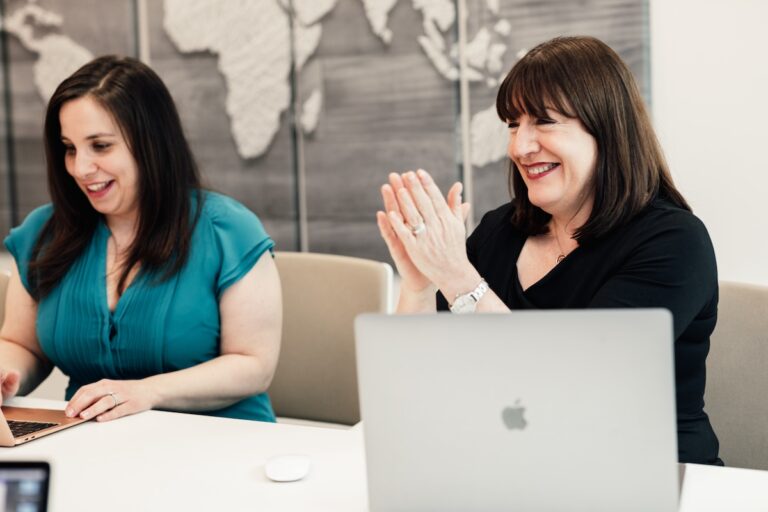In my last blog post, Impostor Syndrome. Are you letting it damage your career growth? I described the negative impacts that Impostor Syndrome can have on our careers. I also promised to share some ideas to help you overcome it. So, that’s the plan for this blog post, looking at ways to silence the impostor, how to end self-doubt and build confidence in yourself.
I wouldn’t say it’s as easy as ABCD. But that is the model I am going to use to outline 4 categories of strategies to consider:
1. Acknowledge your feelings
Realise its ok to feel uncomfortable
When you do something for the first time, it feels weird. Comfort and confidence come from taking action and the situation becoming more familiar. Comfort and confidence also come from a sense of belonging. If you’re the only one or one of a few people in a meeting or workplace who look or sound like you, then it’s only natural to sometimes feel like you don’t fit in. Instead of taking your self-doubt as a sign of your ineptness, recognize that it might be a normal response to being in a new position.
Talk to someone about it
When you keep your thoughts inside, they can become distorted, exaggerated and out of line with reality. This is very much true when it comes to thoughts and feelings of self-doubt. So let them out. Talk to someone close to you like a good friend, manager or mentor about your self-doubts. Just letting them out and saying them out loud can often help you to hear how exaggerated these thoughts have become. And by talking about those doubts you can get a change in perspective.
Spend time with supportive people
The friends and family members in our lives who believe in us and everything that we’re capable of will always be on our side. When you’re feeling self-doubt, surround yourself with these people. They can remind you of how talented and resilient you are during times when you’re not feeling that way about yourself.
2. Build Strength
Remember your past achievements
How many times when we’ve doubted ourselves have our greatest fears come true after we’ve taken action? The answer for me – and probably for you too – is not very often at all. Self-doubts are most often an internal critic that your mind uses to keep within your comfort zone. If you look back and remember how well things have gone despite your self-doubts it becomes easier to let go of them or to ignore them. That will help reduce your fear of failure and to allow you to focus on the more likely positive outcome. Make a conscious effort to track your wins. If you find yourself doubting your ability to complete a project or new goal, pull out the list to remind yourself of your past successes.
Don’t get stuck in the comparison trap
If you compare yourself to other people too often, self-doubt and impostor syndrome can quickly creep up on you. The best way to way to go about things is instead to compare yourself to yourself. See how far you have come. See what you’ve overcome. And see how you’ve kept going, succeeded and grown as a human being.
Get a boost of optimism
Let someone else’s enthusiasm, motivation and constructive optimism flow over to you. Spend 20 minutes with an audiobook, a podcast or a book that gives you that. A quick session can help you shift your self-doubt into optimism and positive self-talk.
3. Challenge your doubts
Your doubts are not the truth
Self-doubts are just your fears made manifest to protect you from loss. Yet the irony is that doubt often makes you lose out on what you may have gained by fearing the attempt. Your doubts are not the truth. Rather they are fear-fuelled stories you create about who you are, what you’re worth and what you’re capable of achieving.
Try positive self-talk
Impostor syndrome often manifests itself as a voice in our heads. It berates us with negative messages like “you’re not smart enough” or “you’re a fraud.” Negative self-talk is a bad habit, and it can heavily influence our stress and anxiety levels.
Change the way you talk to yourself in your head by practicing positive self-talk. Not only can it help you become less stressed and anxious, but it can also help you build the courage to do things that’ll bring you greater rewards.
First, try to catch yourself whenever you have a negative thought. Then, turn around and challenge your own claim. For example, if you find yourself thinking, “I just got lucky,” challenge that by thinking, “What steps did I take and what work did I put in to get to this point?”
Keep a journal
It is often easier to ease fears and doubts if you have an issue laid out on paper rather than if you try to go through it all in your mind. You may realize after you see your concerns written down, that they may not be as detrimental as you thought they were. This can help to gradually overcome self-doubt.
4. Dare to Act
Self-confidence is the opposite of self-doubt. Confidence is a skill you build through action. Don’t wait until you feel confident to act. Change your behaviour first and allow your confidence to build.
Remember your purpose
Why would you bother to step out of your comfort zone? Why would you lay your reputation on the line? Why would you take a chance on that dream? Only when you are clear about your big ‘Why’ can you find the courage needed to take action and risk failing. Finding purpose at work, you need to be able to find a clear and compelling answer to the question “Why is this important to me?” Doing so will help crystallize why you must take action despite your doubts. You will know that if you don’t, you run the bigger risk of one day looking back and wondering ‘What if I’d tried?’
Visualize success
Do what professional athletes do. Spend time beforehand picturing yourself being successful. Visualize all the different elements of making a successful presentation or calmly posing your question in a meeting. It will energise and inspire you to bring that picture to life.
Break down the challenge
We build confidence in increments; by having the courage to act despite our misgivings. One way we do this is by applying the research of BJ Fogg at Stanford University. He found that scaling back bigger behaviours into smaller ‘bite size’ actions can create dramatic shifts that last. Think of courage like a muscle, the more you use it, the stronger it becomes.
Remember you can course-correct along the way
Trying to plan every step needed to achieve a goal or dream can become draining and lead to quite a bit of self-doubt. And it usually won’t work that well since plans often start to fall apart or need some change when they are confronted with reality. So do a bit of rough planning and then start your journey. You can always course-correct as you gather new knowledge, experience and feedback along the way.
Celebrate that small step and win
When you’ve taken one small step forward, then you have a win. It may be a small one but it’s still a win. So, celebrate it. This will renew and recharge your motivation and make taking action feel more exciting and fun. And that will push self-doubts aside so that you can keep moving and get more small and bigger wins.
So there is a range of ideas. Not all of them will suit everyone but hopefully, some of them will suit you. I’d love to hear about your experience. And if you have any other suggestions it would be great to hear those too.
If this post has resonated with you, you may also enjoy our recent post on deeper self-awareness.



